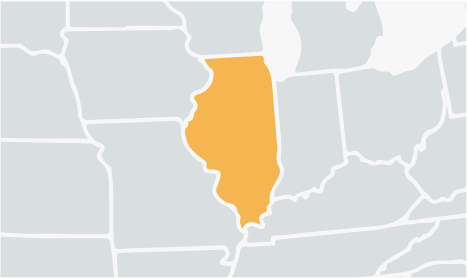| Subgrades | |
| Covered Speech: | D+ |
| Anti-SLAPP Protections: | A |
| Subscores | |
| Covered Speech: | 40 out of 100 points |
| Anti-SLAPP Protections: | 96 out of 100 points |
| Detailed Scoring on Anti-SLAPP Protections | |
| Suspension of Court Proceedings Upon an Anti-SLAPP Motion: | 20 of 20 points |
| Burden of Proof on Plaintiff to Defeat an Anti-SLAPP Motion: | 12 of 12 points |
| Right to an Immediate Appeal: | 25 of 25 points |
| Award of Costs and Attorney Fees: | 36 of 40 points |
| Expansive Statutory Interpretation Instruction to Courts: | 3 of 3 points |
State Anti-SLAPP Statute
Illinois’s anti-SLAPP statute,[1] the Citizen Participation Act, protects any act that furthers the rights of petition, speech, association, or participation in government, including freedom of the press.[2] A 2012 state Supreme Court ruling narrowed what many originally thought was a broadly worded law to protect speakers. Instead, the court applied its protections only to situations in which a SLAPP was “solely based on, relating to, or in response to” the defendant’s speech when petitioning government for a redress of grievances.[3] The ruling effectively added the word “solely” to the law, tipping the scales in favor of plaintiffs in such lawsuits. In 2025, the law was revised in an attempt to address that ruling. Language was added, stating that the “claim does not need to solely pertain to the moving party’s constitutional rights as this Act applies regardless of the motives of the person who brought the claim.”[4]
The Illinois Supreme Court held in 2024 that the law did not necessarily apply to “media defendants regarding news publications.”[5] The Court ruled, “We are simply holding that the Act specifically protects government participation and does not encompass all media reports on matters of public concern.”
The legislature also responded to this point by expressly providing protection for media defendants by stating the law protects the “rights of petition, speech, association, or to otherwise participate in government, including freedom of the press.”
The Illinois statute also appears limited because it provides an exception to the speech covered when the speech is “not genuinely aimed at procuring favorable government action, result, or outcome.” It’s far from clear how the state’s Supreme Court will interpret the amended law and this previous exception.
Discovery is suspended once an anti-SLAPP motion is filed, and statutory revisions enacted in 2025 clarified that filing an anti-SLAPP motion will stay “all other proceedings” in the litigation. To prevail against an anti-SLAPP motion, the respondent must produce clear and convincing evidence that the acts of the movants are not immunized from liability (or are not in furtherance of acts immunized from liability) by the anti-SLAPP statute. The statute requires the appellate court to expedite the movant’s appeal on the motion, whether interlocutory or not. This right of appeal covers both the trial court’s denial of an anti-SLAPP motion and its failure to rule on an anti-SLAPP motion. The court must award costs and attorney fees to the prevailing movant on an anti-SLAPP motion. In general, the anti-SLAPP statute instructs courts that interpret its language to do so “liberally” – an instruction presumably designed to foil readings of the statute in a cramped or narrow way that would exclude marginal cases.
How to Improve Illinois’s Score
The most important part of anti-SLAPP law is the scope of speech that the statute covers. After all, strong statutory protections are of no help to a speaker if the scope of the statute excludes the speech at issue. Although the 2025 revisions to the law appear to expand the statute’s coverage, it’s unclear how the state’s supreme court will eventually interpret the new law. It will likely take many years of litigation to determine whether the new law provides good safeguards for constitutionally protected speech.
If Illinois simply expanded the scope of its statute to cover the same kinds of speech recommended by the Uniform Law Commission’s model Act, the overall grade would rise to A+.
The Uniform Law Commission’s model law protects any speech about a matter of public importance in any forum. The model is explained in the full report and is available here.
[1] 735 Ill. Comp. Stat. 110/15 through 110/99.
[2] Expansion of the law happened in 2025. See SB1181, https://legiscan.com/IL/text/SB1181/2025
[3] Sandholm v. Kuecker, 962 N.E.2d 418, 2012 IL 111443 (Ill. January 20, 2012).
[4] SB1181, https://legiscan.com/IL/text/SB1181/2025
[5] Glorioso v. Sun-Times Media Holdings, LLC, 2024 IL 130137.












